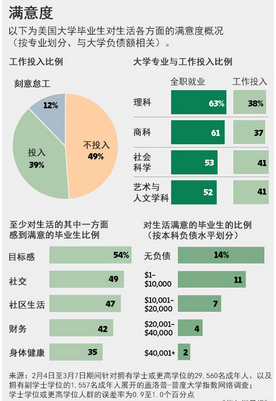(单词翻译:单击)

A word to high-school seniors rejected by their first choice: A degree from that shiny, elite college on the hill may not matter nearly as much as you think.
有一句话要送给那些被自己的首选学校拒之门外的高中毕业生:那所高高在上、光辉夺目的大学的学位或许并没你想的那么重要。
A new Gallup survey of 30,000 college graduates of all ages in all 50 states has found that highly selective schools don't produce better workers or happier people, but inspiring professors -- no matter where they teach -- just might.
盖洛普(Gallup)新近对全美50个州各年龄段的3万名大学毕业生进行了调查,发现录取标准极高的学校并不会造就更优秀的雇员或更快乐的人,但鼓舞人心的老师――无论他们在哪所学校执教――也许能做到这一点。
The poll, undertaken this spring, is part of a growing effort to measure how well colleges do their jobs. This survey adds an interesting twist, because it looked not only at graduates after college; it tried to determine what happens during college that leads to well-being and workplace engagement later in life.
这项调查于今年春季展开,是越来越多的评估大学的工作做得如何的举措之一。该调查增加了一个有意思的做法,它不仅调查大学生在毕业后的状况,还尝试去推断大学期间的什么经历会让他们在日后生活幸福、工作投入。
The poll didn't measure graduates' earnings. Rather, it was rooted in 30 years of Gallup research that shows that people who feel happy and engaged in their jobs are the most productive. That relatively small group at the top didn't disproportionately attend the prestigious schools that Americans have long believed provided a golden ticket to success. Instead, they forged meaningful connections with professors or mentors, and made significant investments in long-term academic projects and extracurricular activities.
该调查未比较毕业生的收入,而是借鉴了盖洛普一项30年的研究;该研究表明心情愉悦及工作投入的人是最有成效之人。处于金字塔顶端的那一小批人并不是绝大多数都上过名校,尽管美国人一直以来都信奉这些名校能提供通往成功的黄金入场券。这些人与老师或导师之间有着对其今后发展意义深远的关系,并对长远学术项目和课外活动进行了大量投入。
'It matters very little where you go; it's how you do it' that counts, said Brandon Busteed, executive director of Gallup Education. 'Having a teacher who believes in a student makes a lifetime of difference.'
盖洛普教育调查执行董事布兰登・巴斯蒂德(Brandon Busteed)说:“你在哪所学校就读并不怎么重要,(重要的是)你是如何度过大学生活的。拥有一位相信你会有所成就的老师会造就不同的人生。”
The poll is the brainchild of former Indiana Republican Gov. Mitch Daniels, who became president of Purdue University in January 2013. As he prepared for the job, Mr. Daniels said he kept bumping into the same problem: a lack of benchmarked data to measure the value of a college degree. Last spring, during a trip to Gallup's D.C. offices, he seized on the idea of applying their engagement and well-being questions, which had been used in other contexts, to college graduates. The index will soon be broken down to the level of individual schools 'for those that have the will, and frankly, the nerve,' Mr. Daniels said.
该调查缘起于前印第安纳州州长、共和党人米奇・丹尼尔斯(Mitch Daniels),他在2013年1月就任普度大学(Purdue University)校长。丹尼尔斯说,在为这一职位做准备时,他不断遇到一个相同的问题:缺乏衡量大学学位价值的基准数据。去年春季,在访问盖洛普华盛顿办公室期间,他采纳了用盖洛普的投入度和幸福感问题来评估大学毕业生状况的建议,盖洛普的这两类问题在其他调研中也有采用。丹尼尔斯说,对于“有意愿,并且坦白说有勇气”的大学,该指数将很快被细分至各所院校的层面。
'There is a lot we don't know about higher education, and there is a sense it's skating on its reputation,' Mr. Daniels said. 'We needed to know with more rigor how well the experience is serving people.'
丹尼尔斯指出:“我们对高等教育还有许多不了解的地方,它给人的感觉就是关乎于名望的。我们需要更精确地了解大学教育经历对人们有多大用处。”
The poll found that just 39% of college graduates feel engaged at work -- meaning, for instance, that they enjoyed what they did on a daily basis and are emotionally and intellectually connected to their jobs. And only 11% reported they were 'thriving' in five different aspects of their lives, among which are financial stability, a strong social network and a sense of purpose.
调查发现,只有39%的大学毕业生感觉对工作投入――意即他们每天都享受自己所干的工作,他们在情感上接纳自己的工作,而且他们的工作与他们的才干很匹配。只有11%的人表示他们在生活的五个不同方面都“欣欣向荣”,这些方面包括财务稳定性、牢固的社交网络和目标感等。
That relatively small handful of graduates -- who tend to be more productive -- went to a variety of colleges, though they were slightly more likely to go to larger schools and less likely to have attended for-profits.
这些数量相对较少的毕业生――他们往往更富成效――读的是各式各样的大学,不过他们就读于大型高校的比例略高,上营利性学校的比例则较低。
The strongest correlation for well-being emerged from questions delving into whether graduates felt 'emotionally supported' at school by a professor or mentor. Those who did were three times as likely to report they thrived as adults. Graduates who reported having 'experiential and deep learning' were twice as likely to be engaged at work as those who didn't.
与幸福生活关联最大的因素从探究毕业生在校时是否感觉“得到(老师或导师的)精神支持”的问题中显露了出来。调查发现获支持之人表述自己成人后获得成功的概率是未获支持之人的三倍。表示经历过“体验式与深层次学习”的毕业生投入工作的概率是无此经历之人的两倍。
University of Pennsylvania Professor Martin Seligman, who has studied the psychology of happiness, said it was impossible to know whether the college experiences Gallup asked about were the cause of later success or simply coincidental to it.
曾研究快乐心理学的宾夕法尼亚大学(University of Pennsylvania)教授马丁・塞利格曼(Martin Seligman)认为,我们不可能确认盖洛普提出的与大学经历有关的问题是否就是日后成功的原因或者仅仅是巧合。
'One hopeful possibility is that if college were changed to produce more emotional support, this would result in much more engagement later in life,' he wrote in an email. 'Another, less interesting possibility' is that people engaged at work who said they were emotionally supported in college are simply upbeat to begin with, and that rosy outlook colors their memories.
他在电子邮件中写道,一个很大的可能性是如果大学转而提供更多精神支持,可能会促成学生在日后的人生中更加投入。另一方面,一个不那么有趣的可能性是,在工作中投入的人声称自己在大学得到精神支持仅仅是因为他们原本就比较积极乐观,那种积极向上的人生观美化了他们的记忆。
Other, less fuzzy correlations were between debt and entrepreneurship. About 26% of graduates with no undergraduate debt started their own business, compared with just 20% of those carrying debt from $20,000 to $40,000. Nearly three-quarters of college graduates leave school with debt; among those who do, the average is nearly $30,000. Graduates with that amount of debt were one-third as likely to report they were 'thriving' as graduates without debt reported.
而债务与创业精神之间的关联则没那么模棱两可。本科无负债的毕业生中约有26%的人开创了自己的企业,而背负着2万至4万美元债务的毕业生只有20%的创业比例。美国约有四分之三的大学毕业生在毕业时身负债务;负债学生的平均债务额接近3万美元。相比无负债的毕业生,背负该数额债务的毕业生认为自己的人生“欣欣向荣”的几率只是前者的三分之一。
The survey's most dramatic takeaway -- that graduation from an elite college provides no discernible advantage over Podunk U -- echoes a refrain that began getting traction about a decade ago. Stacy Dale, an economist at Mathematica, a New Jersey research firm, co-wrote a paper in 2004 that found that students who were accepted to elite schools, but attended less selective schools, went on to earn just as much money as their elite counterparts.
该调查最引人注目的发现是毕业于精英大学相比普通大学毕业并不具备明显的优势。这与大概10年前开始引起关注的一个看法不谋而合。新泽西研究公司Mathematica经济学家斯泰茜・戴尔(Stacy Dale)在2004年与人合着了一篇论文,论文指出,被精英学校录取但最终就读相对普通学校的学生,他们在毕业后的收入与精英学校的毕业生旗鼓相当。
'Individual traits matter more than where you went,' Ms. Dale said. 'It's a lot more important what you learn later in life than where you got your undergraduate degree.'
戴尔指出:“个人特质比你上什么学校更重要。你在日后的生活中学到了什么比你在哪所学校获得本科学位重要得多。”


